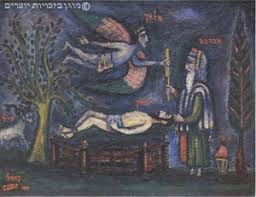 |
| The Binding of Isaac - Moshe Kastel |
... “Is it not a common practice to this day for many a father to sacrifice their sons on the altar of this or that divine expectation, of one or another ideology or firm conviction?” Eli Shimeoni asked rhetorically, when suddenly he started to tremble, as he wondered if this was what he was doing to
his children. Had he sacrificed them on the altar of his beliefs? Just to keep a mad project going? Just because he thought, there was value in keeping an ancient culture alive? Did not our national poet, Yehuda Amichai lament the death of Stalin – mourning the leader of a country that recognized the State of Israel, emperor of socialist equality, the victor over Nazism, rather than celebrating the death of the dictator, murderer of millions? How easily do we all fall prey to false believes, only in retrospect realizing how mad we were!
He wondered, if Abraham argued with Terah when he left his father’s house and went forth to the land unto which God would lead him? What doubts pounded in his heart when he put the burnt offering upon his son, for him to carry the wood, some say cross, of his own sacrifice? ... Without being asked, was little Isaac to carry the Lord of Hosts’ mighty struggle against Asherah, the goddess of the grove, on his shoulders? Was he to be sacrificed, bound to the mother of the morning star and the king of the evening, the mother of the twin brothers Shahar and Shalem – yes, Shalem, the Canaanite king-god and mythological founder of Ir-Shalem?
Is this the story of the Jews’ submission to the father, in which the instincts of the sons bend to the fathers’ discipline, with the rabbis as a Halakhic fortress cementing the power of God, the Father? ...
In some legends, he recalled, Satan tries to prevent Abraham from carrying out the sacrifice. In his role as adversary, instigating toward consciousness, Satan introduces some healthy doubt into what otherwise seems to be passive submission. But in Biblical reality, it is only when the angel calls upon Abraham not to slay his son, that he lowers his hand, and puts away the knife with which he was ready to sacrifice his beloved son. He has passed God’s test of devotion, and the ram is offered in place of Isaac.
But has he passed the
human test of devotion?
 |
| Rembrandt |









